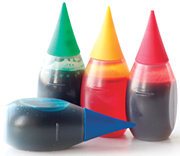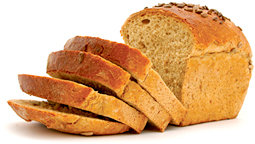10 Other Food Additives to Avoid
1 Artificial Sweeteners Splenda or Sucralose, Acesulfame-K ( also known as Acesulfame-potassium or Sunette) and Saccharin. Splenda is chlorinated sugar, although it can be made chemically without any sugar at all. Contrary to manufacturers' claims, it is partially absorbed and metabolized in the body. Recent independent studies have shown a strong relationship between Splenda and migraine headaches. Acesulfame-K has caused cancer in lab animals. It has not been adequately tested.
2 Saccharin was once banned as a carcinogen, but was delisted in 1997 due to industry pressure. Studies still show that it may cause cancer. Artificial sweeteners, in general, have been linked to weight gain.
3 Ingredients derived from corn, soy, canola or cottonseed If they are not organic, these ingredients are probably genetically modified. In the U.S., 60-70 percent of the food on the grocery store shelves contains genetically modified ingredients. Genetically modified ingredients are not required to be labeled in the U.S., and it's not likely it will be required in the near future.
 4 Hydrogenated or partially hydrogenated oils If the label says "No Trans Fats," check the ingredients to make sure there are no partially hydrogenated oils. It is legal to say "No Tans Fats" if there is less than 0.5 grams per serving. However, what's listed as a serving size on the label is often less than one might eat in a single serving. So the amount of trans fat consumed would be more than the 0.5 grams. More importantly, though, is that no amount of trans fat is safe.
4 Hydrogenated or partially hydrogenated oils If the label says "No Trans Fats," check the ingredients to make sure there are no partially hydrogenated oils. It is legal to say "No Tans Fats" if there is less than 0.5 grams per serving. However, what's listed as a serving size on the label is often less than one might eat in a single serving. So the amount of trans fat consumed would be more than the 0.5 grams. More importantly, though, is that no amount of trans fat is safe.
5 Artificial colors or FD&C colorsMost are derived from coal tar, which is a known carcinogen. They must be certified by the FDA not to contain more than 10 ppm of lead and arsenic. Certification does not address any harmful effects these colors may have on the body. They may contain carcinogenic contaminants and cause allergic reactions.
6 Olestra or Olean This "fake fat" robs the body of carotenoids and fat- soluble vitamins. It required a warning on the label until 2003 because of the severe gastrointestinal symptoms which may occur after ingesting. However, the FDA relaxed the requirement for a warning label based upon industry-sponsored studies and stated that "most consumers are aware of the fat substitute's potentially adverse gastrointestinal effects."
 7 Nitrates and nitrites They are mostly in processed meats. The FDA knows nitrates and nitrites cause cancer, but allows them because they prevent botulism. They can also cause headaches and dizziness. Carrageenan Also known as Irish Moss. There are two forms of carrageenan that are important here. Native carrageenan and degraded carrageenan. Native carrageenan has not caused cancer in lab animals, but there is not enough data available yet to determine whether it is carcinogenic to humans. Degraded carrageenan has caused cancer in lab animals and is classified as a possible human carcinogen by the International Agency for Research on Cancer. According to renowned carrageenan researcher Dr. Joanne Tobacman, native carrageenan can be broken down in the stomach to the degraded form. Carrageenan is also a possible source of hidden MSG.
7 Nitrates and nitrites They are mostly in processed meats. The FDA knows nitrates and nitrites cause cancer, but allows them because they prevent botulism. They can also cause headaches and dizziness. Carrageenan Also known as Irish Moss. There are two forms of carrageenan that are important here. Native carrageenan and degraded carrageenan. Native carrageenan has not caused cancer in lab animals, but there is not enough data available yet to determine whether it is carcinogenic to humans. Degraded carrageenan has caused cancer in lab animals and is classified as a possible human carcinogen by the International Agency for Research on Cancer. According to renowned carrageenan researcher Dr. Joanne Tobacman, native carrageenan can be broken down in the stomach to the degraded form. Carrageenan is also a possible source of hidden MSG.
8 BHA and BHT Widely used antioxidants. BHA is also a preservative. BHA can cause liver and kidney damage, behavioral problems, infertility, weakened immune system and is classified as a possible carcinogen by the International Agency for Research on Cancer. BHT cannot be evaluated for its ability to cause cancer because of a lack of data. The studies just haven't been done. BHT has been banned in several countries, but not in the U.S.
 9 Caffeine It's addictive and may cause headaches, irritability, nervousness, and fertility problems. It increases the risk of miscarriage, birth defects, low birth weight, heart disease, behavioral changes, insomnia. There is not enough data available to determine if it can cause cancer in humans. It's in energy drinks which contain as much or more caffeine than a cup of coffee. These beverages are sold at middle schools and high schools, and kids are drinking multiple cans a day.
9 Caffeine It's addictive and may cause headaches, irritability, nervousness, and fertility problems. It increases the risk of miscarriage, birth defects, low birth weight, heart disease, behavioral changes, insomnia. There is not enough data available to determine if it can cause cancer in humans. It's in energy drinks which contain as much or more caffeine than a cup of coffee. These beverages are sold at middle schools and high schools, and kids are drinking multiple cans a day.
10 Potassium bromate Used mostly in bread and baked goods to give them a sponge-like quality. It's a possible carcinogen and can cause nervous system issues, kidney disorders and gastrointestinal upset. Banned worldwide, except for the U.S. and Japan.

